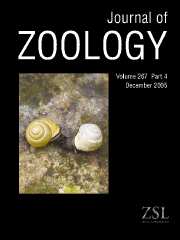Crossref Citations
This article has been cited by the following publications. This list is generated based on data provided by
Crossref.
Meiri, Shai
Simberloff, Daniel
and
Dayan, Tamar
2005.
Insular Carnivore Biogeography: Island Area and Mammalian Optimal Body Size.
The American Naturalist,
Vol. 165,
Issue. 4,
p.
505.
Koepfli, Klaus-Peter
Gompper, Matthew E.
Eizirik, Eduardo
Ho, Cheuk-Chung
Linden, Leif
Maldonado, Jesus E.
and
Wayne, Robert K.
2007.
Phylogeny of the Procyonidae (Mammalia: Carnivora): Molecules, morphology and the Great American Interchange.
Molecular Phylogenetics and Evolution,
Vol. 43,
Issue. 3,
p.
1076.
Nicholls, Henry
2007.
The royal raccoon from Swedesboro.
Nature,
Vol. 446,
Issue. 7133,
p.
255.
McFadden, K. W.
Gompper, M. E.
Valenzuela, D. G.
and
Morales, J. C.
2008.
Evolutionary history of the critically endangered Cozumel dwarf carnivores inferred from mitochondrial DNA analyses.
Journal of Zoology,
Vol. 276,
Issue. 2,
p.
176.
Helgen, Kristofer M.
Maldonado, Jesús E.
Wilson, Don E.
and
Buckner, Sandra D.
2008.
Molecular Confirmation of the Origin and Invasive Status of West Indian Raccoons.
Journal of Mammalogy,
Vol. 89,
Issue. 2,
p.
282.
MacPhee, R. D. E.
2009.
American Megafaunal Extinctions at the End of the Pleistocene.
p.
169.
Whiteside, Douglas P.
2009.
Nutrition and Behavior of Coatis and Raccoons.
Veterinary Clinics of North America: Exotic Animal Practice,
Vol. 12,
Issue. 2,
p.
187.
Meshaka, Walter E.
Smith, Henry T.
Cress, Heather L.
Sekscienski, Stacey R.
Mapp, William Russ
Cowan, Ernest M.
and
Moore, Jon A.
2009.
Raccoon (Proycon lotor) removal and the rapid colonization of the green iguana (Iguana iguana) on a public land in South Florida: A conservation opportunity for the Caribbean.
Caribbean Journal of Science,
Vol. 45,
Issue. 1,
p.
15.
de Villa-Meza, Alejandra
Avila-Flores, Rafael
Cuarón, Alfredo D
and
Valenzuela-Galván, David
2011.
Procyon pygmaeus (Carnivora: Procyonidae).
Mammalian Species,
Vol. 43,
Issue. ,
p.
87.
Masseti, Marco
2011.
Anthropochorous mammals of the Old World in the West Indies.
mammalia,
Vol. 75,
Issue. 2,
Turvey, Samuel T.
Brace, Selina
and
Weksler, Marcelo
2012.
A new species of recently extinct rice rat (Megalomys) from Barbados.
Mammalian Biology,
Vol. 77,
Issue. 6,
p.
404.
Helgen, Kristofer M.
Pinto, Miguel
Kays, Roland
Helgen, Lauren
Tsuchiya, Mirian
Quinn, Aleta
Wilson, Don
and
Maldonado, Jesus
2013.
Taxonomic revision of the olingos (Bassaricyon), with description of a new species, the Olinguito.
ZooKeys,
Vol. 324,
Issue. ,
p.
1.
Trujillo, Alexa L.
and
Hoffman, Eric A.
2017.
Uncovering discordance between taxonomy and evolutionary history in Florida raccoons.
Systematics and Biodiversity,
Vol. 15,
Issue. 1,
p.
74.
Longman, Emily K.
Rosenblad, Kyle
and
Sax, Dov F.
2018.
Extreme homogenization: The past, present and future of mammal assemblages on islands.
Global Ecology and Biogeography,
Vol. 27,
Issue. 1,
p.
77.
Wallman, Diane
2018.
Histories and Trajectories of Socio-Ecological Landscapes in the Lesser Antilles: Implications of Colonial Period Zooarchaeological Research.
Environmental Archaeology,
Vol. 23,
Issue. 1,
p.
13.
Turvey, Samuel T.
Marr, Melissa M.
Barnes, Ian
Brace, Selina
Tapley, Benjamin
Murphy, Robert W.
Zhao, Ermi
and
Cunningham, Andrew A.
2019.
Historical museum collections clarify the evolutionary history of cryptic species radiation in the world's largest amphibians.
Ecology and Evolution,
Vol. 9,
Issue. 18,
p.
10070.
Willcox, D.
2020.
Conservation status, ex situ priorities and emerging threats to small carnivores.
International Zoo Yearbook,
Vol. 54,
Issue. 1,
p.
19.
Angelici, Francesco Maria
and
Rossi, Lorenzo
2020.
Problematic Wildlife II.
p.
3.
Louppe, Vivien
Baron, Juliette
Pons, Jean‐Marc
and
Veron, Géraldine
2020.
New insights on the geographical origins of the Caribbean raccoons.
Journal of Zoological Systematics and Evolutionary Research,
Vol. 58,
Issue. 4,
p.
1303.
Lorvelec, Olivier
Yvon, Tristan
and
Lenoble, Arnaud
2021.
Histoire de la petite mangouste indienne Urva auropunctata (Hodgson, 1836) dans les Antilles: une introduction aux conséquences sociétales et écologiques majeures.
Anthropozoologica,
Vol. 56,
Issue. 1,




